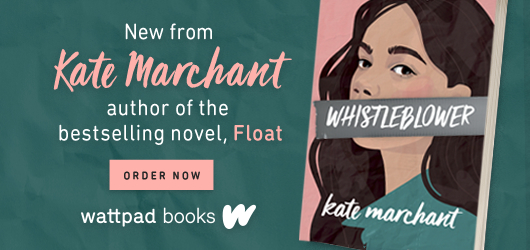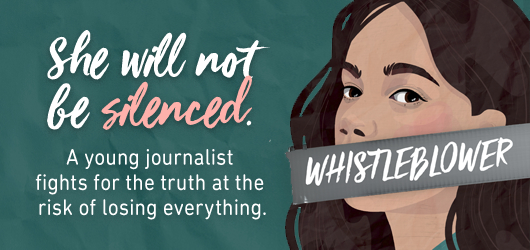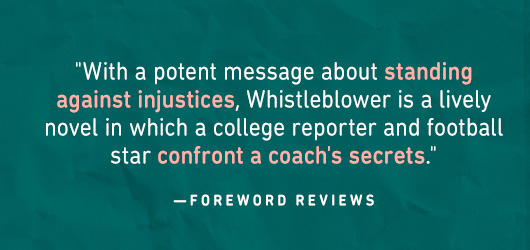Kate Marchant's powerful new YA will blow you away!
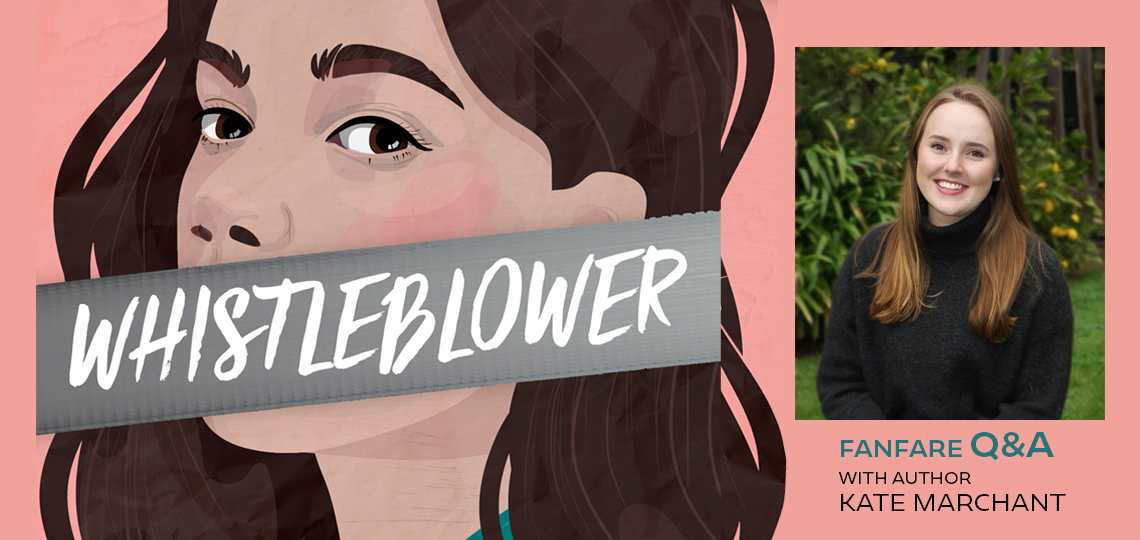
Reviewer Karen Rigby Interviews Kate Marchant, Author of Whistleblower
What happens on campus … definitely doesn’t stay on campus—not anymore anyway. Which is a good thing in the case of #MeToo and other social-media-led initiatives shedding light on sexual violence, discrimination, injustice, and the like. Say what you will about Senator Josh Hawley’s recent proposal to ban social media for teenagers under a certain age, but we must always keep in mind the good it can do and try to find a regulatory sweet spot.
Today’s guest, Kate Marchant, is with us to talk about the reasons she felt compelled to write a novel about university life, power, athletics, romance, and yes, social media. That book, Whistleblower, earned a highly complimentary review from Karen Rigby in Foreword’s March/April issue, which, in turn, compelled us to set up the following reviewer-author conversation.
Enjoy!
Laurel, a young journalist, faces a culture of silence about sexual misconduct—even in a #MeToo era—because of football’s continuing lucre for the university system. What drew you to this topic?
While Whistleblower is fully a work of fiction, I was definitely inspired by my undergrad experience at the University of Southern California.
After graduation—while I was trying to figure out what to do with a creative writing degree—I had a lot of time to reflect on what it meant to attend a private party school with a PAC-12 football team and a whole lot of institutional wealth and power. I realized I wanted to explore that institutional power (I’ve always been fascinated by men’s sports, a space that feels so off-limits and untouchable to me) and I wanted to unpack what it meant to be a young woman on a campus where you were always aware that you were never fully safe (a roommate and I once had our drinks spiked at the same frat house on two consecutive weekends; my sophomore year, a serial predator, nicknamed the booty bandit, seemed like an urban legend until a friend became one of his victims).
Solidarity among women friends and fellow reporters is a vital theme. Where do you think people might begin to nurture or improve on such relationships?
In my opinion, solidarity is about listening and showing up. Women get mocked for gossiping, but the truth is that gossip—sharing information, sharing stories—gives women an immense amount of power within systems that benefit from keeping them silent and afraid. Learn to listen without bias. Learn to show up and support women who are standing up against systems much bigger than themselves. There’s strength in numbers and power in our stories.
Laurel and her friends risk their personal safety and reputations for the sake of truth in reportage. When even the campus newspaper is tied by its funding sources and administrative oversight, and fear of censorship lingers, how might students (fictional or otherwise) still work to convey their stories?
I think social media is ultimately the answer. In the book, Laurel and her friends take the article to social media after the school newspaper shuts it down. This wasn’t me doing something groundbreaking—there are so many stories now about students taking to social media to share stories about corruption within their schools, their sports teams, their communities. Obviously, I’m a huge supporter of journalism, but when the institutions built to support journalists and their work are bought out by corporations or other entities, sometimes you have to go rogue!
Amid the novel’s serious topics, how did you find balance with levity?
Here’s the thing: rage is exhausting. I’ve been mad about the environment, I’ve been mad about international conflicts. I’ve been mad about women’s rights. There’s so much to get angry about—and that anger is a powerful and necessary catalyst for action, but it’s also really easy to burn out on it.
You have to crack jokes. You have to go to the party with your friends and do something embarrassing. You have to let yourself have a crush on that guy in your lecture. I knew going into this book that I wanted it to be fun, despite the seriousness of what these characters are up against, because I want readers to remember that there’s so much worth fighting for.
One of the novel’s compelling twists is romance between Bodie, a football player, and Laurel, who is bound by her ethics as a reporter, yet who is still attracted to him. Tell us how you created their characters?
I’ve always loved romance, and I’ve always been drawn to books where the two leads have to overcome big external conflicts that drive a wedge between them. Initially, I was aiming for a true enemies-to-lovers dynamic, but I realized very early on that Bodie needed to be someone we could root for. Enemies-to-lovers is absolutely no fun if one of the leads is a miserable, irredeemable bigot!
So Bodie’s character ended up being very similar to Laurel’s: they’re both finding their voices, they both have a sense of duty that makes their attraction to each other feel dangerous and forbidden, and they’re both fundamentally kind and good people.
Are there any specific ingredients that you think make a college romance appealing to many other readers, too?
With college romance, it’s the little things. It’s the mortification of arriving late to a big lecture and getting called out by your professor. It’s the buzz of pregaming for a night out and wondering if you’ll bump into your crush. It’s the adventure of figuring out who you are and what interests you in the great big world out there.
I think those moments of relatability are really important in college romance. Also: forced proximity! Campus, house parties, lectures, group projects, dorms and apartments. This niche is really ripe with opportunities to push characters together and make them work out their differences.
Outsidership plays a role: Laurel’s half-Mexican background is sometimes a source for racism, such as at the country club, and she’s also, as a woman, considered to be an interloper in the sports arena. Did writing within this perspective reveal any new insights, frustrations, or sensitivities?
I’m a straight white cisgender woman, so it’s safe to say I’m not one of the leading voices of outsidership. Studying intersectionality doesn’t give you the lived experience of other identities. It’s just not the same.
Laurel’s background was partly inspired by my mom (who is white and whose first language was Spanish, and who worked as a lawyer in male-dominated firms for her entire career) but also inspired by some of the unbelievably out-of-touch, sexist, and racist behavior I’ve witnessed in my life—behavior that, no matter your identity, should piss you off and make you want to rant to someone.
It can be so difficult to navigate your desire to speak up for your friends and loved ones, for people who maybe have more to lose than you do, when you don’t want to steal the mic. I think writing Laurel’s perspective really helped me reflect on myself as a storyteller and explore that line between knowing when to speak up, because you can take the hit, and knowing when to step back and let people tell their own stories.
Close to Valentine’s Day, is there an aspect of Bodie and Laurel’s relationship that was especially fun to write? What qualities define their love?
I love their softness! These two are so, so soft with each other, despite the circumstances, and I always loved writing the scenes where one of them is standing up for themselves or really putting themselves out there emotionally, because it’s always met with softness from the other.
They’re not passive and they don’t let the heavy topics between them slide, but there’s always an understanding and an eagerness to communicate, and that’s what I believe makes their love so beautiful.
WHISTLEBLOWER
In Kate Marchant’s novel Whistleblower, a young journalist chases a story about a revered football coach’s misconduct.
Laurel is a junior at Garland, a southern California college, who believes herself to be forgettable. The Daily, the newspaper she reports for, is restrained by its faculty supervision. But the choice between risking the paper’s funding and investigating the truth is easy for Laurel. Her instincts prompt her to look into harassment allegations against Coach Vaughn. She uses social media to reach out to a woman with a story to tell, and she learns about the coach’s drinking habits and an off-campus assault.
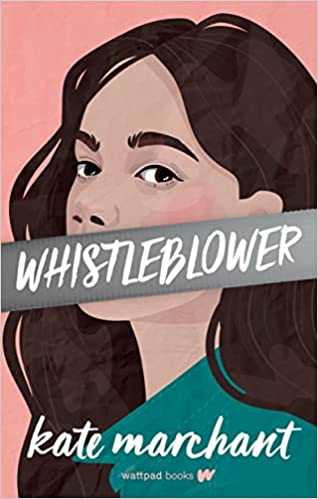
Then Laurel meets the team’s popular quarterback, Bodie, who is genuine and good-looking. Her interview with him is pivotal. She is torn between her growing attraction to Bodie and her commitment to gathering the facts to break the story, while Bodie has sincere, conflicted responses to the fact that his mentor’s reputation is unraveling. They come to a gradual, shared understanding of the situation over class group work and run-ins with each other; though they face frustrations, they’re also enticed by the sweetness of their connection.
Football culture, game day fervor, and the alcohol-infused gatherings that surround both complicate matters. Meanwhile, the book’s #MeToo themes are handled with measured outrage. Laurel and her fellow women reporters press forward despite their fears of repercussions—and Laurel’s discomfort with the fact that the volatile situation puts her in the spotlight. Her friendship with a second-stringer on the team is a more upbeat feature.
With a potent message about standing against injustices, Whistleblower is an lively novel in which a college reporter and a football star confront a coach’s secrets.
Reviewed by Karen Rigby March / April 2023
Karen Rigby

